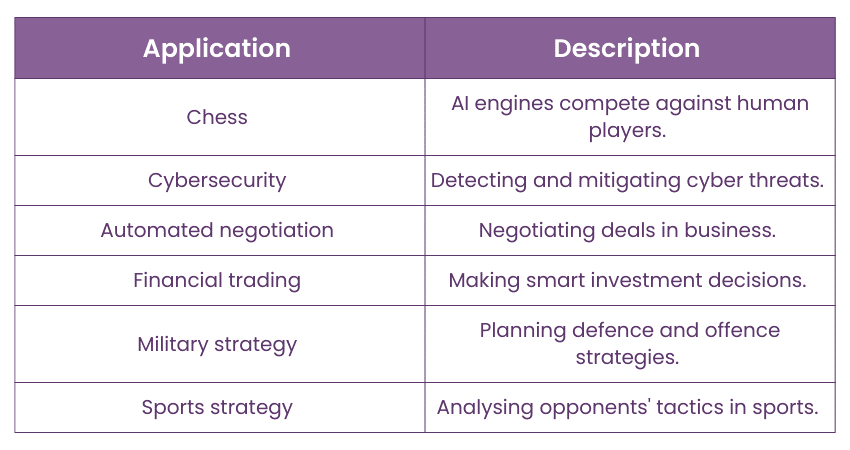We may not have the course you’re looking for. If you enquire or give us a call on 01344203999 and speak to our training experts, we may still be able to help with your training requirements.
We ensure quality, budget-alignment, and timely delivery by our expert instructors.

Artificial Intelligence (AI) has made significant advancements in replicating the decision-making mechanisms of humans. One crucial aspect is Adversarial Search in Artificial Intelligence, a subfield of AI that deals with decision-making in competitive, adversarial environments.
According to Market.us, the global Generative AI in Gaming Market size amounted to £922 million in 2022. These statistics indicate the increasing use of AI in the aspect of gaming. That's why it’s crucial to understand its importance in AI. This blog will explore Adversarial Search in Artificial Intelligence, explaining its fundamentals, key algorithms and real-world applications.
Table of Contents
1) What is Adversarial Search in Artificial Intelligence?
2) The Minimax algorithm
3) Alpha-beta Pruning
4) Adversarial Search in real-world applications
5) Conclusion
What is Adversarial Search in Artificial Intelligence?
Game theory, a mathematical framework for analysing interactions between rational decision-makers, forms the theoretical foundation of Adversarial Search. In this context, a "game" refers to any situation where multiple players make decisions that affect each other's outcomes. Game theory provides tools to understand and predict how these players will behave strategically to maximise their own interests.
Now, Adversarial Search has become fundamental to Artificial Intelligence (AI), focusing on decision-making in competitive scenarios. It's commonly associated with games and strategic interactions. Game theory in economics helps analyze competitive behavior and strategic decision-making in various contexts. In this approach, an AI agent aims to make optimal decisions while anticipating the actions of an opponent with opposing goals.
The key idea behind Adversarial Search in Artificial Intelligence is to model the interaction as a game, often using principles from game theory. It involves constructing a game tree that represents all possible moves and outcomes and selecting the best activity for the AI agent based on a strategy that minimises the maximum potential loss (hence, the term Minimax).
Embrace the future with Artificial Intelligence & Machine Learning – Elevate your potential today!
The Minimax algorithm
The Minimax algorithm is a fundamental technique in Adversarial Search, particularly in AI's decision-making processes within competitive environments. Its name derives from its central idea: minimising the maximum potential loss is crucial when an AI agent competes against an opponent, aiming to maximise the AI's losses.
Imagine a classic board game like chess or tic-tac-toe. The Minimax algorithm constructs a game tree that exhaustively explores all possible moves and their outcomes. At each level of the tree, it alternates between maximising and minimising the potential effect, with the AI agent and the opponent taking turns.
Unlock the power of AI for DevOps efficiency and innovation with Artificial Intelligence (AI) For DevOps Course - Embrace AI-driven automation today. Join now!
Alpha-beta Pruning
Alpha-beta Pruning is a clever optimisation technique employed in conjunction with the Minimax algorithm in Adversarial Search, primarily used in competitive games and decision-making scenarios. Its aim is to minimise the computational workload needed for exploring a game tree by excluding branches that are certain to be less than optimal.
Imagine a game of chess, a game with an enormous number of possible moves. Alpha-beta Pruning proves invaluable in reducing the computational workload. During the search, Alpha-beta Pruning maintains two parameters:
a) Alpha: Represents the maximum score found along the path for the AI agent
b) Beta: Represents the minimum score for the opponent.
As the search progresses, when the algorithm identifies a move leading to a worse situation than what's known (a lower score than beta), it prunes or cuts off that branch, as it's irrelevant. Similarly, if it finds a move leading to a better situation than alpha, it updates alpha with a higher value.
Unlock the future of AI with OpenAI Training – where innovation meets expertise.
Adversarial Search in real-world applications
Adversarial Search in Artificial Intelligence extends beyond board games and is used in various real-world applications to solve competitive decision-making problems. Let's see how:
Chess and Adversarial Search
Chess is a prime example of Adversarial Search in action. Powerful chess engines, like Deep Blue and AlphaZero, employ advanced techniques to search vast game trees and select optimal moves against human opponents.
Other applications

Adversarial Search extends its influence into a range of practical domains, it is visible in:
a) Cybersecurity: AI-driven systems use Adversarial Search to detect and mitigate cyber threats. By modelling potential attack strategies and vulnerabilities, these systems can proactively defend against cyberattacks.
b) Automated negotiation: In business and commerce, Adversarial Search aids automated negotiation systems. These systems strategise during negotiations to secure the best possible deals for their users, all while considering the competitive stance of the other party.
c) Financial trading: In financial markets, algorithmic trading systems employ Adversarial Search to make informed investment decisions in dynamic and competitive environments, optimising trading strategies and minimising risks.
d) Military strategy: Adversarial Search plays a role in military applications, where AI systems help analyse and develop tactical and strategic plans for defence and offence, considering the potential actions of adversaries.
e) Sports strategy: In sports like soccer and basketball, Adversarial Search is used to analyse opponents' tactics and devise strategies to outmanoeuvre them. Coaches and analysts rely on these AI-driven insights to gain a competitive edge.
Conclusion
Adversarial Search in Artificial Intelligence is a fascinating concept that has found its way into various aspects of our lives, from entertainment in the form of board games to critical applications in cybersecurity and finance. By understanding the Minimax algorithm, Alpha-Beta pruning, and the principles of game theory, we can appreciate how AI systems make strategic decisions in competitive environments.
Unlock the future with AI, join our Introduction to Artificial Intelligence Training and become part of the AI revolution today!
Upcoming Data, Analytics & AI Resources Batches & Dates
Date
 Introduction to AI Course
Introduction to AI Course
Fri 28th Mar 2025
Fri 23rd May 2025
Fri 25th Jul 2025
Fri 26th Sep 2025
Fri 28th Nov 2025






 Top Rated Course
Top Rated Course



 If you wish to make any changes to your course, please
If you wish to make any changes to your course, please


